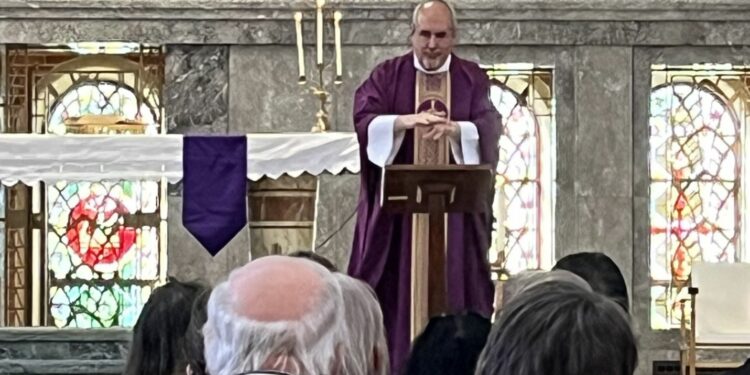“In the past, the Deaf typically went to interpreted Masses, and it was very wonderful for the hearing Church to provide a sign language interpreter, but the Deaf always felt like outsiders,” he said. “They weren’t really a part of a full Church life. And so now that our community, our people can take a role in doing readings and usher[ing] and Christmas parties, things like that, they can be further a part of it, and I’m happy to see the progress that we’re making so far.”
Challenges facing Deaf Catholics
Even though ASL is the third most commonly used language in the U.S. after English and Spanish, fewer than 8 in 100 Deaf people attend church, suggesting that the population is underreached and under-evangelized.
Though a growing number of catechetical resources are being made available for Deaf Catholics, Catholic evangelism for the Deaf falls behind other Christian denominations.
Depcik said that many Deaf people will become Mormons or Jehovah’s Witnesses because they have more outreach to Deaf communities, while in the Catholic Church, budget cuts following the sexual abuse crisis have impacted smaller ministries such as the Deaf community the most, he explained.
Because of this, many Deaf Catholics will leave for a church where the pastor is learning sign language and “meeting their spiritual needs,” Depcik said.
In addition, most Deaf children are born to a hearing family that does not have an in-depth understanding of ASL.
“So, many of them grow up having no understanding of religion. They go to a hearing church, but they’re not understanding what’s happening,” Depcik explained.
“Ninety-eight percent of Deaf people do not go to church … because there is not accessibl[ity],” he explained. “Oftentimes, they are overlooked by the Church. And I always like to say, the people in the Church are the deaf to Deaf people, because the communication, there is no link there with other groups.”
In response, Depcik is organizing a Eucharistic Congress for the Deaf in Emmitsburg, Maryland, in April 2025. While the National Eucharistic Congress has partnered with NCOD to have interpreters and accessibility for Deaf Catholics, the Eucharistic Congress for the Deaf will “be spoken in sign language for people to come pray together,” Depcik said.
‘Inspiring’ retreat for the Deaf at Seton Shrine
(Story continues below)
Subscribe to our daily newsletter
Just a half hour away from the K-8 Maryland School for the Deaf is the small town of Emmitsburg, which is home to the National Shrine of St. Elizabeth Ann Seton. The Seton Shrine hosts retreats, including a Lenten retreat for the Deaf in March.
Initially, the retreat organizer, Sarah Heil, and Depcik thought the retreat would draw about 30-35 people. But as the date approached, the attendees became closer to 100, with attendees traveling from Virginia, D.C., New Jersey, Pennsylvania, Delaware, and West Virginia for the one-day retreat.
“We couldn’t get the group out of our visitor center because they were just so excited to see each other and to meet new people. … It was like the community formed up so quickly,” Heil told CNA in a phone call.
Depcik said it’s “always inspiring” to come together with Deaf Catholics from different areas because they share “the same faith, the same language, the same culture.”
“And it’s a good experience for local Deaf Catholic communities to be surprised that there [are] more deaf Catholic[s] out there,” he said. “And they always feel alone because the Church is in their own world, and when they see other groups getting together, they feel proud.”
Following the call of Pope Francis, the Seton Shrine is reaching out to the margins through its retreat program “Seeds of Hope,” which recently hosted a retreat for men recovering from drug addiction, and will host a mental health and wellness retreat this May.
Credit: Source link



